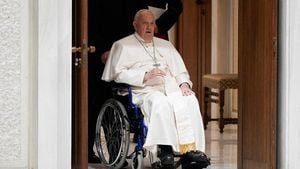The saga of Maria Verônica Aparecida César Santos, known as the "Grávida de Taubaté," continues to resonate across Brazil more than a decade after her infamous pregnancy hoax shocked the nation. Amidst her first television appearance since 2012, she revealed her experiences and reflections on the elaborate deception she orchestrated. During her interview on SBT’s Domingo Legal, hosted by Celso Portiolli, set for February 23, 2025, Maria spoke candidly about the consequences of her actions and the emotional turmoil she endured at the time.
Back in January 2012, the initial reports of Maria’s supposed pregnancy with quadruplets captivated the public's attention. Highlighted extensively across popular television shows, sympathy for her claims surged as she shared struggles she claimed to face as a single mother. Donations poured in, with people offering everything from clothing to baby furniture for the imagined quadruples. Yet, as investigators began to dig, the story began to fracture under scrutiny.
Maria’s pregnancy was called suspicious by many, including journalists and medical professionals. Questions arose concerning the size of her belly, which appeared disproportionately large for her alleged gestational stage. This peculiar observation, coupled with her reluctance to allow physical touch on her stomach, raised red flags among investigators. "The pregnant woman moved easily and showed no discomfort typical of multiple pregnancies," one expert noted, underscoring inconsistencies within her claims.
Every detail contributed to mounting speculation, leading to eventual revelations. Investigations revealed her "pregnancy" was simply the result of a silicone prosthesis, constructed to deceive the media and the public. The fallout was swift and severe; Maria was accused of fraud and faced intense backlash from those who had previously sympathized with her plight.
Reflecting on her actions during the interview, Maria Verônica expressed deep remorse and sadness, stating, "I never told anyone I was poor. I lost my life, let’s say." Now, she seeks to clarify the emotions and circumstances surrounding her decision to fabricate such dramatic events, citing instability and the influence of those around her as contributing factors.
Despite years of silence and distance from the public eye—wrought with criticism and allegations of fraud—Maria has recently emerged, hoping to set the record straight, even confronting the larger issue of fake news and journalistic integrity. The consequences of her deception were painfully clear; she lost not only her credibility but also her career. Once managing her own private school, Maria’s professional life took a dramatic downturn as her former institution struggled to survive amid the scandal.
The impact of the Grávida de Taubaté story did not end with Maria. It sparked discussions about the role of media and its responsibilities to verify facts before disseminational exposure. The story turned viral, leading to discussions about the dangers and responsibilities associated with media influence and public perception. It's often cited as one of Brazil's prominent examples of strained media ethics, offering lessons for journalists to approach future stories with greater scrutiny and accountability.
Now, as Maria aims to rebuild her identity and aims to redefine herself outside the shadow of the scandal, she has created a YouTube channel intending to share her experiences candidly. "I hope people recognize me by my true name, not the tainted label of Grávida de Taubaté," she asserts. With this platform, she seeks to talk about faith, healing, and the lessons learned through her harrowing experience. Her wish to help others avoid similar pitfalls marks her path to redemption.
The Grávida de Taubaté case serves as both cautionary tale and social commentary, reflecting the effect of personal narratives on public sentiment and the grave realities of misinformation. Whether audiences will embrace Maria’s new chapter remains to be seen, but her attempts at honesty can at least provide foundational hope for her own path to reform.



